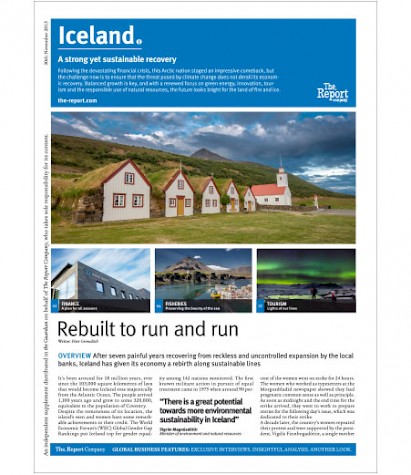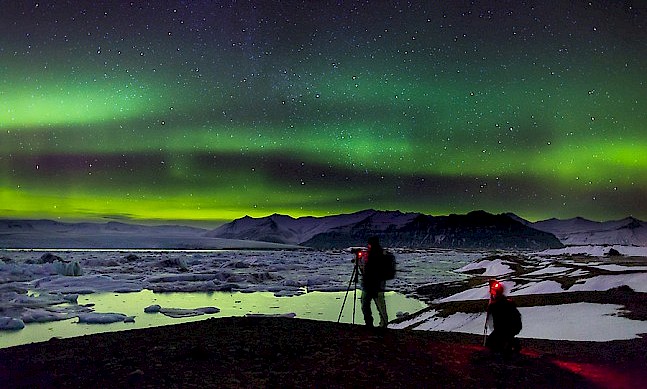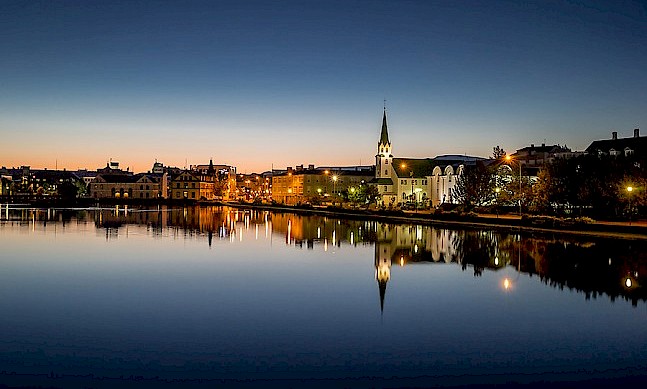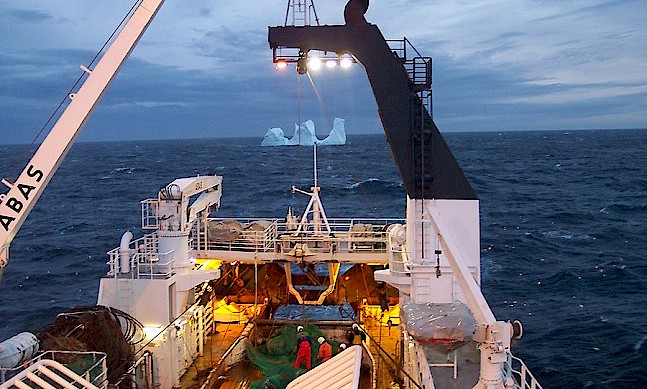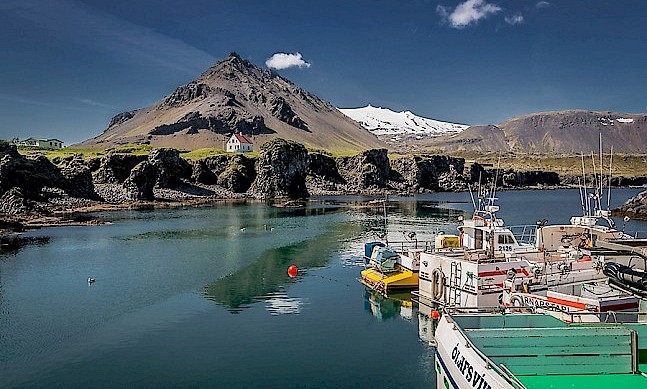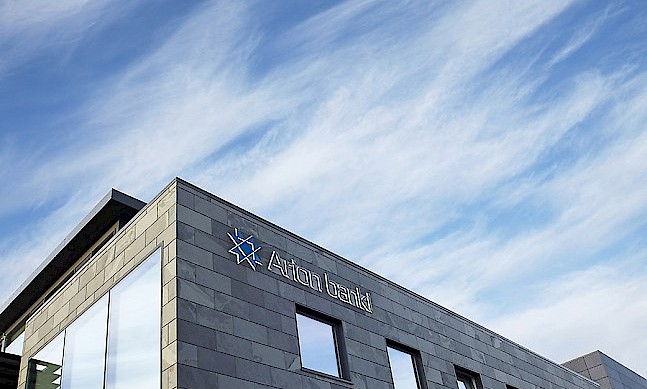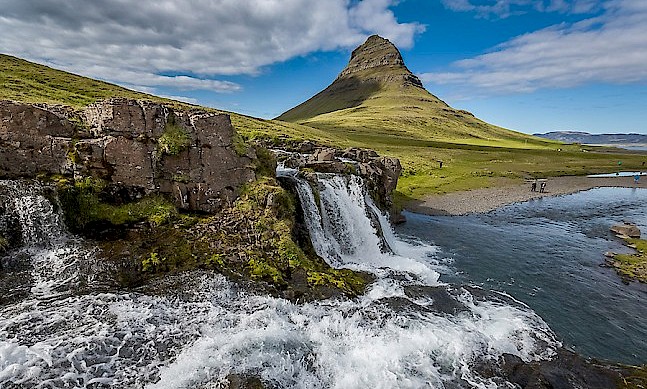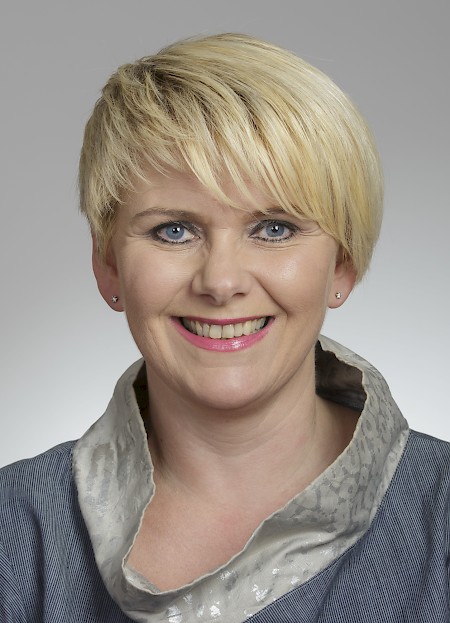 Ragnheidur Elin Arnadottir, Minister of Industry and Commerce. Photo: Ministry of Industry
Ragnheidur Elin Arnadottir, Minister of Industry and Commerce. Photo: Ministry of Industry
Ragnheidur Elin Arnadottir became Iceland’s industry minister in May 2013. In an interview with The Report Company, she outlined Iceland’s recovery from the crisis of 2008 and highlighted the bright spots in the country’s economy.
The Report Company: Could you give us a picture of the state of the Icelandic economy right now?
Ragnheidur Elin Arnadottir: We are at a very good stage and we have good prospects for the future. This is as a result of many combining factors. If you go back seven years, some very tough decisions were made during the crisis, but these were very prudent decisions, such as the emergency legislation and the imposing of the capital controls, although nobody wants to see them continue and we are working actively to remove them. These were brutal but necessary decisions that were made at the outset, and these have been the basis of our speedy recovery. There is also the fact that we have our own independent currency.
Since this government took over, we have taken very conscious steps to make sure to fix the things that had been wrong, for example we are dedicated to improving the business environment, lowering taxes, deregulating, simplifying the environment as much as we can, and facilitate new investment, both domestic and foreign. There has been turmoil over the past seven years, and there has been a lot going on, but it is very gratifying to look back and see that we seem to be on the right path not only to recovery but to growth and prosperity.
TRC: What have you done differently to the other European countries which still haven’t recovered fully from the crisis?
REA: Maybe those decisions that we took initially. Mind you, they were taken out of necessity. I am not saying that we are smarter and brighter than the rest of Europe. We couldn’t afford to save our banks. We couldn’t afford to pour funds into them as has been done in other countries, and that has prolonged the crisis in other countries. If you rewind to October 2008, nobody would have thought that we were in an advantageous position. We were the canary in the mine, although we did not know that at the time. We were the first to go. And what history has told us since is that it was not just an Icelandic crisis. It was a global economic crisis, and we have seen casualties along the way.
I would think that those initial decisions and the fact that we are small have helped us. We had to take the pressure out somewhere and we took it out in our currency and did it fast. This means that we have been able to build up ever since. We had a short rise in unemployment, but that recovered fairly quickly.
There are always two sides to every coin. We have a small currency, one could say that it’s instable, which it definitely is, but you could also call it another name which is flexible. That has definitely helped us in our recovery process to be able to tap the pressure in the beginning, and be able to build up from there.
In every crisis, there are opportunities. We didn’t see it at the time, but with the devaluation of the krona by 50 percent during the crisis, it made it 50 percent less expensive for foreign visitors to visit. Iceland has always been a rather expensive destination, but all of a sudden we became much less expensive, and that increased the number of visitors, plus the publicity, some would say notoriety of the economic crisis as well as the , volcanic eruption gave us that free advertising.
The other industry I would like to mention is the start-up industry, because in the years leading up to the crisis, the banks and the financial institutions had drawn all the talent, the best and the brightest, into the banks. When the crisis hit, these people lost their jobs. All of a sudden we had a lot of engineers, mathematicians, businesspeople, bright people who were out of a job. They didn’t just sit at home waiting for somebody to help them. They said, “I’ve always wanted to start my own company, I’m going to do that now.” So a lot of the innovative, creative, entrepreneurial turmoil that has been just booming ever since was the result of the crisis. We could never have foreseen this. There are a number of companies that are products of this crisis. We have many success stories that we are very proud of, and we as a government have been focusing very much on this since we took over, on helping this environment to grow. We want to make sure that the playing field is as good as we can make it from our side, and then just get out of the way to allow companies to flourish.
“All the talent, the best and the brightest, was working at the banks. When the crisis hit, these people lost their jobs. They didn’t just sit at home waiting for somebody to help them. They started companies”Post This
TRC: What are the main opportunities for investors?
REA: We have seen growing interest in Iceland as an investment site. This is very good because after the crash, we saw the lowest investment levels since World War Two. We have a few projects already underway in the energy-intensive sector, in the aluminium industry, and we are now seeing more interest from the silicon industry. These are in primary production, then we have an American company which has come in with new technology where they combine the aluminium with the silicon industry in an environmentally friendly way to make components for solar panels. Solar and silicon are the biggest investment projects that we have on the horizon for the next few years. But other areas include data centres, where we have seen huge growth. They are coming here because of the renewable energy, which is the bulk of the cost of operations, and they can also save on cooling by simply opening the window, so they have to spend less on energy.
We have seen much growth in the tourism industry followed by increased investment both in hotels and in different products for the tourists.
TRC: How feasible are the plans for an electricity cable linking Iceland with the UK?
REA: There is great interest from the UK in the electricity sector, particularly with the idea of running a cable from Iceland to the UK. I have met with my British counterpart there, and we have been examining this for a few years now. My predecessor put together a cross-political, cross-industry committee that came out with a report which said that this is obviously an interesting possibility but that there are challenges. We need to examine it further; it’s an issue that has been revisited every decade since the 1960s, and every decade this comes up as a potential possibility, but it always has been ruled out. However, now the experts say that it is technologically possible. It would be the longest underwater cable ever built, and this is the North Atlantic were talking about so it is definitely every engineer’s dream to tackle this project. I have always said that before we make a decision we need to have all the facts in front of us, and always with Icelandic interests at heart. Therefore we are currently conducting several studies, such as the economic feasibility of such a cable for Iceland. These results will be the basis for decisions on the next step. We know there is interest in England, we know the investors’ interests, and we are in conversation with the British authorities.
“We don’t need a lot of people to make a decision. We have a can-do mentality, which is very valuable for us”Post This
TRC: What is your medium-term outlook for the economic sectors your ministry covers?
REA: The forecasts for the tourism industry are for continued growth, and that is maybe our biggest challenge now, just to make sure that we are all working in the same direction. Stable growth is what we are aiming for, to be able to control it and manage the industry.
In the industrial sector, with those big investment projects that are underway, we see an important build-up in areas that have been short of economic growth, for example in the north where the PCC plant is being built, that is a remote area that has been struggling with keeping its population, because the job opportunities haven’t been that exciting. These projects are going to be very important locally as well as economically because they are all export driven.
I see great potential in the various industries, the new industries, and that is probably the most interesting challenge of all, to take that entrepreneurial spirit and make it into an engine, and to have new different industries that we never even thought would be able to be here. Look at the cosmetics industry. I personally haven’t bought a foreign cream for years, because all of a sudden we have world-class companies whether it’s the Blue Lagoon or ORF Genetics. I can recommend them all. This has become a huge industry and the potential there is enormous. Also, in the pharmaceutical industry we see important development there; we have technological companies that are everything from gaming companies to visual arts and filming.
TRC: What incentives are available for film production?
REA: We’ve had a tax rebate system in place since 1999 to attract foreign film producers to Iceland, and now we have this simple system: there is a 20 percent rebate to production companies, whether they are Icelandic or foreign, of all tax-deductible costs incurred in Iceland. This in addition with our wonderful natural landscape, makes Iceland a very good place for film producing. We have seen Clint Eastwood, Russell Crowe and Ben Stiller all film here; we have been a location for Game of Thrones; we have had an explosion in this which helps our tourism industry as well. We don’t have the biggest film industry, but we have a very tight, qualified industry with a no-nonsense approach, and this leads to Hollywood wanting to make movies here. This has also resulted in an increase in postproduction projects. We have decided to renew this system and want to create the most favourable environment.
TRC: How would you like Iceland to be perceived and what would be your message to potential investors?
REA: I would say that Iceland is a well-developed, sophisticated economy that has the same rules of law as in any other Western country. We are part of the European Economic Area, but what we have to offer to investors or visitors in addition to that is something that is unique and different from the rest of the world, and that is that we are easily accessible. We are strategically located and with high connectivity, whether that be internet connectivity or transportation.
Another unique aspect of Iceland is the entrepreneurship and what I would call the “island mentality”. If there is a problem, we need to solve it, and we are few so we just get on with it ourselves. We don’t need a lot of people to make a decision. We have a can-do mentality, which is very valuable for us.
It is easy to do business; we are working on cutting red tape and simplifying regulation. With the progress that we are making and with our future plans of continuing to simplify the tax code and being more competitive, I think that Iceland is a fantastic place to do business.


